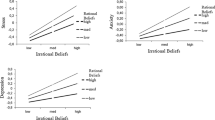Abstract
Nonassertive individuals completed a measure of Ellis's irrational beliefs. Subjects were then divided into a high-endorsement and a low-endorsement group. Subjects who endorsed the irrational beliefs were observed to be less assertive and described themselves as more uncomfortable when role-playing assertion situations. In addition, the high-endorsement group described themselves as less frequently assertive in real life and as far more uncomfortable when confronted with assertion situations. Discussion focused on the specific irrational beliefs endorsed by nonassertive subjects.
Similar content being viewed by others
References
Alberti, R., & Emmons, M. L.Your perfect right: A guide to assertive behavior. San Luis Obispo, Calif.: Impact, 1974.
Alden, L., Safran, J., & Weideman, R. A comparison of cognitive and skills training strategies in the treatment of unassertive clients.Behavior Therapy, in press.
Clarke, J., & Arkowitz, H. Social anxiety and self-evaluation of interpersonal performance.Psychological Reports 1975,36 211–221.
Ellis, A.Reason and emotion in psychotherapy. New York: Stuart, 1962.
Gambrill, E., & Ritchey, C. An assertion inventory for use in assessment and research.Behavior Therapy 1975,6 550–561.
Goldfried, M., & Sobocinski, D. Effect of irrational beliefs on emotional arousal.Journal of Consulting and Clinical Psychology 1975,43 504–510.
Lange, A., & Jakubowski, P.Responsible assertive behavior: Cognitive/behavioral procedures for trainers. Champaign, Ill.: Research Press, 1976.
Ludwig, L. D., & Lazarus, A. A. A cognitive and behavioral approach to the treatment of social inhibition.Psychotherapy: Theory, research, and practice 1972,9 204–206.
Schwartz, R., & Gottman, J. Toward a task analysis of assertive behavior.Journal of Consulting and Clinical Psychology 1976,44 910–920.
Smith, R. Social anxiety as a moderator variable in attitude-similarity-attraction relationship.Journal of Experimental Research in Personality 1972,6 22–28.
Smith, R., & Sarason, I. Social anxiety and the evaluation of negative interpersonal feeback.Journal of Consulting and Clinical Psychology 1975,43 429.
Wolfe, J., & Fodor, I. Modifying assertive behavior in women: A comparison of three approaches.Behavior Therapy 1977,8 567–574.
Author information
Authors and Affiliations
Rights and permissions
About this article
Cite this article
Alden, L., Safran, J. Irrational beliefs and nonassertive behavior. Cogn Ther Res 2, 357–364 (1978). https://doi.org/10.1007/BF01172652
Issue Date:
DOI: https://doi.org/10.1007/BF01172652




